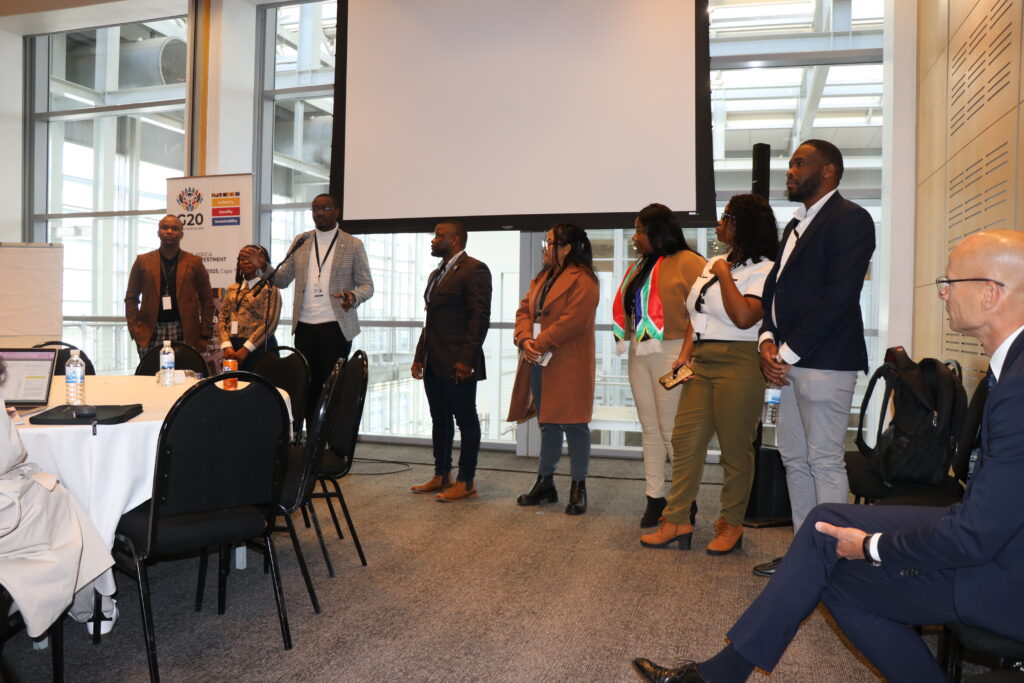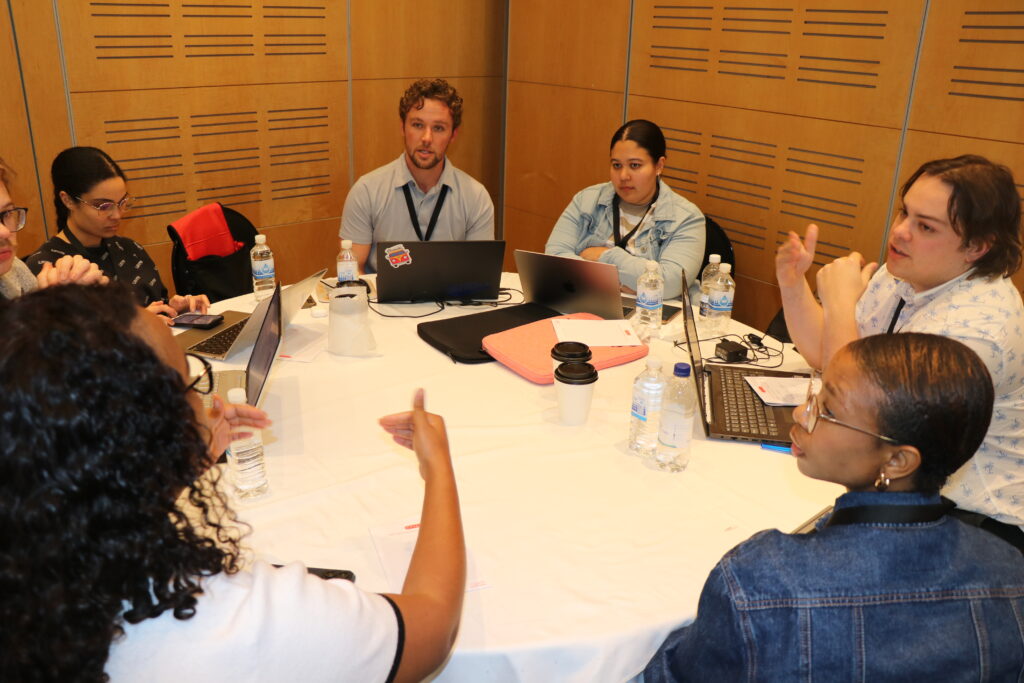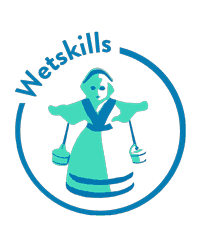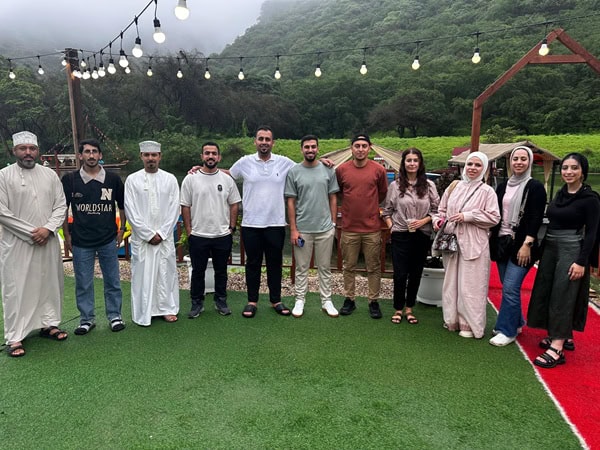This August, Cape Town marked a significant moment in Africa’s water investment story. From 13 to 15 August 2025, the AU–AIP Water Investment Summit brought together heads of state, investors, and sector leaders to address the continent’s staggering US$30 billion annual water investment gap. Within this high-level setting, the AU–AIP Youth Water Investment Hackathon stood out as a dynamic platform for young innovation, demonstrating that young Africans are ready not just to participate but to take the lead in solving critical water issues.
Blog by Craig Tinashe Tanyanyiwa (Regional Manager: Southern Africa, Wetskills Foundation and Senior Analyst: Water Footprint Implementation)
Five teams of students and young professionals were tasked with developing sustainable, investment-ready solutions across water infrastructure, sanitation, irrigation, hydropower, and institutional capacity. Over three intensive days, they progressed from initial concept to polished investment pitches, guided at every stage by experienced facilitators, including Wetskills alumni: Ms Philadelphia Ngobeni, Mr Shalongo Angula, Dr Ashton Mpofu, Mr Kgadi Makgakga , and myself. Our involvement reflected the Wetskills approach: immersive, mentorship-driven, and designed to push participants to think critically about real-world water challenges.
 The facilitators and mentors (With former Wetskills Ambassador, Hank Ovink, on the far right)
The facilitators and mentors (With former Wetskills Ambassador, Hank Ovink, on the far right)
Unlike typical Wetskills challenges, where pitches are brief two-minute “elevator” presentations, the AU–AIP hackathon allowed participants to develop longer pitch decks, providing more space to articulate technical details and investment potential. Despite this, the nerves were the same: teams faced scrutiny, tight deadlines, and the pressure of pitching to a panel of esteemed adjudicators. I personally facilitated the pitching and finals session, witnessing first-hand how participants transformed initial concepts into professional, investment-ready presentations.
 (Picture left: Shalongo delivering a training on developing value propositions)
(Picture left: Shalongo delivering a training on developing value propositions)
The judging panel brought together diverse sector expertise, ensuring a thorough evaluation of each project. Members included Dr Maryna Storie (Global Water Partnership Southern Africa), Anton Earle (ICLEI), Shamil Tumisang Agosi (Square Gate Group), Mfanelo Ndlela (ILambu Global), and Mookho Mathaba (DBSA). Projects were assessed on problem-solution fit, feasibility, impact, and communication/business readiness – criteria that are strikingly aligned with Wetskills’ challenge framework.
Mentorship was at the heart of the process. Alongside Dina, Mfanelo, Mhlengi, Mendy Shozi, Philadelphia, Shalongo, and Ashton, I guided teams on value propositions, technical feasibility, stakeholder engagement, and storytelling for impact. Through workshops and the Mentor World Café, participants learned to shape their ideas for real-world investment while refining their pitch delivery.
After careful deliberation, the winning solutions were announced during the plenary session. First place was awarded to Aqualinks, a real-time water quality data platform developed by postgraduate students from the University of Stellenbosch, offering an innovative solution for monitoring and responding effectively to water quality issues. Second place went to Buka Amanzi, a digital tool designed to bridge government water data with community needs, developed by postgraduate students from the University of Cape Town. Both teams impressed the adjudicators with their blend of technical expertise, innovation, and investment readiness.
 Team Aqualinks from the University of Stellenbosch during the Mentor World Café session
Team Aqualinks from the University of Stellenbosch during the Mentor World Café session
What struck me during the hackathon was how naturally the event reflected the Wetskills model. Our approach – immersive, mentorship-heavy challenges where interdisciplinary teams craft actionable solutions – is increasingly recognised on continental platforms. The AU–AIP Youth Hackathon adopted our approach, yet allowed for the nuance of longer, structured pitch decks, demonstrating that the core principles of collaboration, problem-solving, and innovation can be adapted to different formats and scales.
The event also showcased the increasing profile of the Wetskills brand. Our alumni acting as facilitators proved that the model not only develops talented young innovators but can also expand to larger, more demanding platforms. It served as a strong reminder that Wetskills’ approach is more than just a training programme: it is a recognised framework for nurturing Africa’s future water leaders.
The final day brought the participants’ efforts to life. The top two teams gave condensed versions of their pitches to a large audience, including policymakers, investors, and senior leaders from various sectors. The award ceremony, led by Mhlengi Ngcobo and Albain Tchangou, the AIP Youth Coordinator and Communication Officer, culminated in the winners being celebrated by dignitaries, including South Africa’s Minister of Water and Sanitation, H.E. Ms Pemmy Majodina, and other regional ministers. For these young innovators, it was a truly transformative experience – from initial ideas to continental recognition in just three days.
Looking ahead, the AU–AIP Youth Water Investment Hackathon reinforced the principle that Africa’s water future will be shaped by young, ambitious minds guided by mentorship and supported by proven frameworks like the Wetskills Challenges. By translating youthful ingenuity into practical, investable solutions, we are helping to ensure that Africa’s next generation is not only participating in water sector development but leading it.
For those keen on exploring this journey of innovation, past Wetskills challenges highlight how our model continues to promote multidisciplinary collaboration, real-world problem-solving, and tangible outcomes. The AU–AIP Hackathon demonstrates that these principles are not limited to our challenges – they are shaping the wider water sector, gaining momentum and visibility across the continent.


